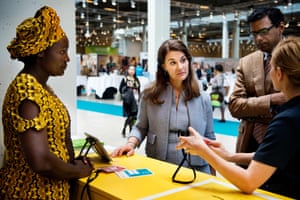Interview with Melinda Gates:“Great wealth can be very confusing. It can inflate and distort your sense of self.”
The philanthropist and wife of Bill Gates on what she tells her kids, getting women into tech and the perils of wealth
Melinda Gates is co-founder of the Bill & Melinda Gates Foundation, which she set up with her husband, Bill Gates. It is the largest private charitable organisation in the world and uses Microsoft’s billions in diverse philanthropic drives: supplying vaccines and birth control to developing countries and working to get the world’s 130 million girls not in formal education into school. Gates was herself educated in an all-girls Catholic high school in Dallas and studied computer science and economics at university before taking a job with “a smallish software company called Microsoft”. Her new book The Moment of Lift is an illuminating and often moving scrutiny of the ways in which the lot of women can be improved; her argument is that it is only by involving women that the world will be changed for the better. She lives in Seattle with her husband and their three children.
What, aside from donating, are the top three things a western woman could do to improve her situation and help the world beyond herself?
The first thing I’d urge is: look into your own home. Figure out whether you have true equality. Sit down with your partner and say: “OK, who is doing the dishes? Who is putting the rubbish out? Who is doing the gardening? Do we need to make some changes?” [Her book describes her own negotiations with Bill over divisions of labour – he volunteers to do the school run.] And if there isn’t equality, you need to bring up some tough conversations about unpaid labour in your home. The second thing that still needs saying to women is that it is essential to vote – and to vote for candidates whose policies best support women. And the third thing is: look at your workplace. Is there full transparency about pay?
The first thing I’d urge is: look into your own home. Figure out whether you have true equality. Sit down with your partner and say: “OK, who is doing the dishes? Who is putting the rubbish out? Who is doing the gardening? Do we need to make some changes?” [Her book describes her own negotiations with Bill over divisions of labour – he volunteers to do the school run.] And if there isn’t equality, you need to bring up some tough conversations about unpaid labour in your home. The second thing that still needs saying to women is that it is essential to vote – and to vote for candidates whose policies best support women. And the third thing is: look at your workplace. Is there full transparency about pay?
You were a high flyer in tech, but in those early days had barely evolved as a campaigner for women’s rights. Why is it now so important to you to attract more women into tech jobs?
Because these are the best jobs in society. They are high-paying jobs. We are all using tech, and I believe women need to be involved in creating the new products of the future, ones that we all want to use. And it is also important because we need to avoid there being any bias against women in the technology we are creating.
Because these are the best jobs in society. They are high-paying jobs. We are all using tech, and I believe women need to be involved in creating the new products of the future, ones that we all want to use. And it is also important because we need to avoid there being any bias against women in the technology we are creating.
You say women’s issues are being decided by men in the US and that this is the sign of a backward society – what can be done to turn this around? In particular, you highlight the shocking fact that in the US, there is no law ensuring paid maternity leave for new mothers.
I want all men and women to know that it is a shared responsibility to turn things round. But yes, I am working systematically with the foundation on these issues. I have started up an office called Pivotal Ventures that works specifically on women’s issues in the United States and have been, in particular, supporting research on medical leave and the difference it makes.
I want all men and women to know that it is a shared responsibility to turn things round. But yes, I am working systematically with the foundation on these issues. I have started up an office called Pivotal Ventures that works specifically on women’s issues in the United States and have been, in particular, supporting research on medical leave and the difference it makes.
You write about how crucial family planning/contraception is as a tool for progress. As a Catholic yourself, it must have been tricky promoting birth control…
Yes – I had to wrestle with this issue because I grew up in a church that is not in favour of contraceptives for women. It was very difficult for me. I had to reflect about it deeply before I came out publicly. I was quite nervous, but when I thought about it in silence and asked myself: “What do I believe, what counsel would I give my own children at appropriate ages?” I thought: this is just right for women. I was travelling to these developing-world countries and so many women opened their lives to me and shared stories about what they needed to plan their families. And I thought, somebody needs to stand up and say something. For there is no country that has made it from middle income to high income in the last 50 years without going through the transition of having contraceptives widely available to people. If we care about women, we should be delivering contraception, because it is the greatest anti-poverty tool we have ever had.
Yes – I had to wrestle with this issue because I grew up in a church that is not in favour of contraceptives for women. It was very difficult for me. I had to reflect about it deeply before I came out publicly. I was quite nervous, but when I thought about it in silence and asked myself: “What do I believe, what counsel would I give my own children at appropriate ages?” I thought: this is just right for women. I was travelling to these developing-world countries and so many women opened their lives to me and shared stories about what they needed to plan their families. And I thought, somebody needs to stand up and say something. For there is no country that has made it from middle income to high income in the last 50 years without going through the transition of having contraceptives widely available to people. If we care about women, we should be delivering contraception, because it is the greatest anti-poverty tool we have ever had.
Does your work ever leave you discouraged?
Any time I go to a low-income country and meet people, I know that I have to let my heart break. I don’t think there is a single time I go out that I don’t see heartbreaking things. But I also see encouraging things, so I look for potential and then try to figure out: how are we going to scale those things up? That is how I counterbalance the things that are hard.
Any time I go to a low-income country and meet people, I know that I have to let my heart break. I don’t think there is a single time I go out that I don’t see heartbreaking things. But I also see encouraging things, so I look for potential and then try to figure out: how are we going to scale those things up? That is how I counterbalance the things that are hard.
Your chapter on the subject of child brides is particularly harrowing – how likely do you think it is that child brides will one day be a thing of the past?
I am hopeful, because I see more countries committing to saying: we don’t want our girls married before they are 18. But it takes time for society to change. If you look at this issue decade by decade, it is changing for the better – but not fast enough. It took me a while to face the existence of child brides, precisely because it is so painful. Yet this is one we have to talk about and work on changing.
I am hopeful, because I see more countries committing to saying: we don’t want our girls married before they are 18. But it takes time for society to change. If you look at this issue decade by decade, it is changing for the better – but not fast enough. It took me a while to face the existence of child brides, precisely because it is so painful. Yet this is one we have to talk about and work on changing.
Why do you write that empathy is more effective than outrage?
Outrage is a knee-jerk emotional response, but empathy helps you take in the other person’s point of view and decide what you are going to do with it and how you are going to move forward. There might be times when you need to use anger, but you must always use it strategically.
Outrage is a knee-jerk emotional response, but empathy helps you take in the other person’s point of view and decide what you are going to do with it and how you are going to move forward. There might be times when you need to use anger, but you must always use it strategically.
I admire your honesty in the book. You say: “Great wealth can be very confusing. It can inflate and distort your sense of self.” Have you ever found it did that for you?
There have been moments when that happens. That’s why it is so important to have good friends and family members around you. My brothers and sisters are truth-tellers, and will remind me that I am just like them. And I have three great women friends I go walking with every Monday morning. If I turn up with a distorted view of myself, they will remind me who I am as I walk along in my jogging pants. I have three kids to remind me too.
There have been moments when that happens. That’s why it is so important to have good friends and family members around you. My brothers and sisters are truth-tellers, and will remind me that I am just like them. And I have three great women friends I go walking with every Monday morning. If I turn up with a distorted view of myself, they will remind me who I am as I walk along in my jogging pants. I have three kids to remind me too.
Speaking of kids, do you approve of Greta Thunberg and her crusade against climate change?I think it is fabulous – any kid who says, ‘I don’t want to live in a world that keeps warming up,’ is fabulous.
How much do you worry about the world your children are inheriting?
I remind them that their job is to find their talent and use their passions to guide them. And that might be about changing the world – as we know, so many kids don’t like what they are reading in the headlines and want things changed. I try and give my children courage. I tell them: don’t believe society has to be a particular way. That’s how I parent my kids. I tell them: go out into the world and be who you are meant to be.
I remind them that their job is to find their talent and use their passions to guide them. And that might be about changing the world – as we know, so many kids don’t like what they are reading in the headlines and want things changed. I try and give my children courage. I tell them: don’t believe society has to be a particular way. That’s how I parent my kids. I tell them: go out into the world and be who you are meant to be.
• The Moment of Lift: How Empowering Women Changes the World by Melinda Gates is published by Bluebird



Comments
Post a Comment